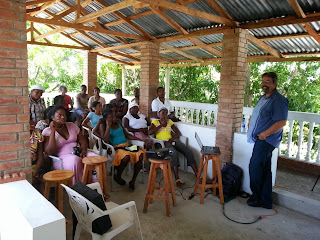Small Business Development: Haiti

Jim Crandall training new entrepreneurs. Small business development is a multi-dimensional and fluid process. In Haiti, programs like F2F and Makouti Agro-Enterprise support farmers in establishing a production system – an essential component to starting a business. By providing person-to-person, hands-on training, F2F and Makouti contribute to increasing producers’ chances of success. In addition to a healthy, efficient production system, a business needs a business plan to guide decisions about facilities, production, and marketing, with an eye towards profitability and long-term sustainability. This past June, F2F volunteer Jim Crandall applied his experience in cooperative business development to assist producer networks in Haiti. His focus was on enabling producers to make business decisions based on the network as a whole, not just on individuals. Jim spent his first week in the Port-au-Prince area working specifically with two rabbit producer associations. He led sessi...


